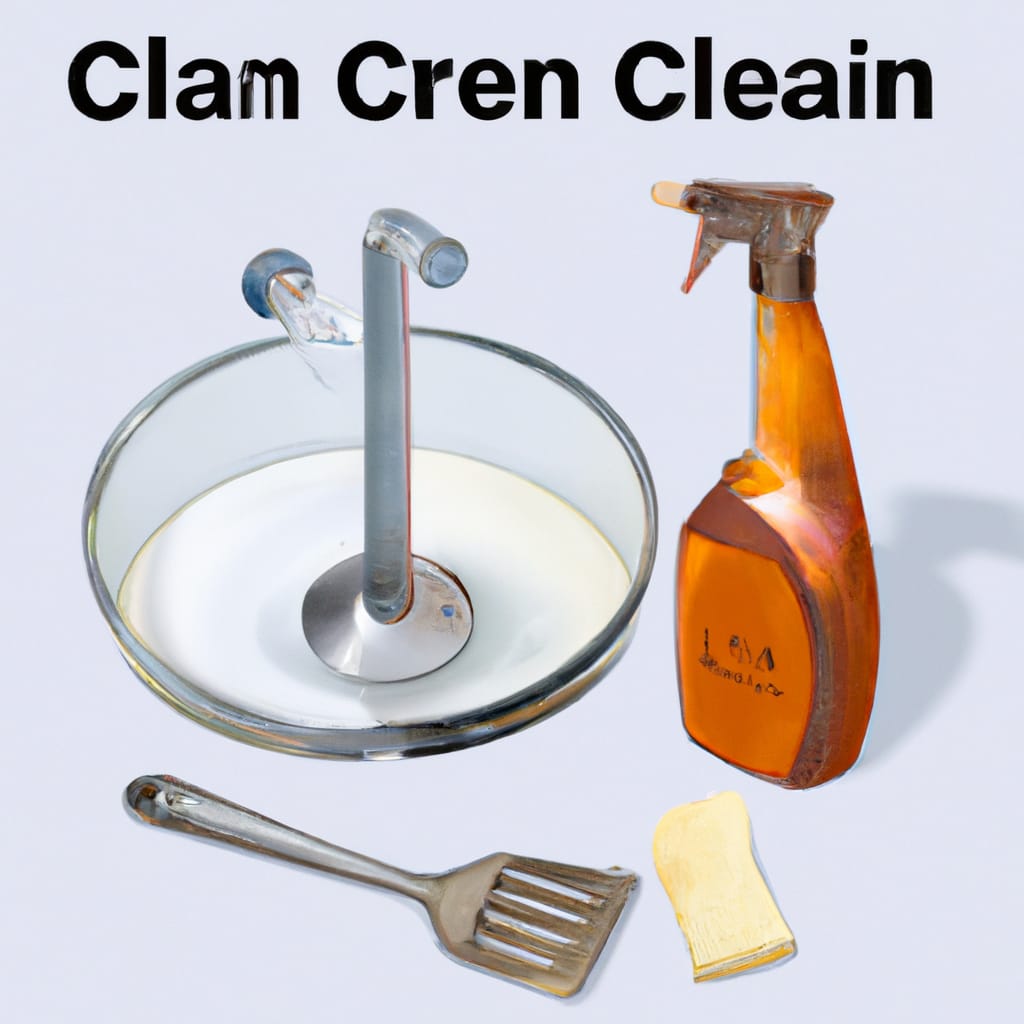Rust can be a major problem in the kitchen, but it doesn’t have to ruin your kitchen utensils. If you take the right steps, you can easily clean rust off your kitchen utensils and make them look brand new. With these helpful tips and tricks, you can easily remove rust and have your kitchen utensils looking like new. So, let’s get started and learn how to clean rust off kitchen utensils!

What Are the Benefits of Cleaning Kitchen Utensils?
Cleaning kitchen utensils has many benefits, such as preventing the spread of bacteria and germs that can cause food-borne illnesses. Clean utensils also help keep food fresh and reduce the risk of cross-contamination. Cleaning also helps maintain the quality of cookware, such as pots and pans, and can extend their life. Additionally, clean utensils can help keep the kitchen smelling fresh and looking presentable. Regular cleaning is also important for keeping appliances in top working condition, which can help save time and energy in the long run.
What Type of Rust Is Present on the Utensils?
The type of rust present on the utensils is known as ferric oxide rust. This form of rust is caused by the oxidation of iron and is characterized by a reddish-brown color. It is often formed when metal is exposed to water and oxygen for an extended period of time. In the case of utensils, this occurs when they are left to sit in water or exposed to high levels of humidity. The rust usually appears in the form of flakes or patches and can quickly spread across the metal surface if left untreated. It is important to remove rust from utensils as soon as it is noticed, as it can corrode the metal and reduce the life of the utensil.
What Products Should Be Used to Clean Rust Off Kitchen Utensils?
To clean rust off kitchen utensils, it is best to use a combination of non-abrasive, rust-removing products. Depending on the severity of the rust, a rust-removing gel or liquid, such as Naval Jelly Rust Dissolver or Iron Out Rust Stain Remover, can be used. To help remove rust from hard to reach areas, a wire brush or steel wool can be used. To prevent further rusting, a rust-inhibiting product, such as WD-40 or Rust-Oleum Rust Reformer, should be applied. It is also important to rinse the utensil with warm water and a mild detergent after using any rust-removing product.
Are There Any Natural Alternatives to Cleaning Rust Off Kitchen Utensils?
Yes, there are natural alternatives to cleaning rust off kitchen utensils. Vinegar and lemon juice are two popular natural rust removers. To use vinegar, soak the utensil in a bowl of vinegar overnight and then scrub the rust off with a stiff brush. To use lemon juice, coat the rust-affected area with lemon juice and allow it to sit for several hours before scrubbing off the rust. Baking soda is another natural rust remover. Make a paste of baking soda and water and spread it on the utensil before scrubbing off the rust.
How to Clean Rust Off Kitchen Utensils?
Rust can be a tough problem to tackle when it comes to kitchen utensils. The best way to clean rust off kitchen utensils is to scrub the affected area with a soft cloth and a paste made from baking soda and water. If the rust is more difficult to remove, use steel wool to scrub gently and reapply the baking soda paste as needed. For tougher rust stains, a mixture of white vinegar and water can be used to soak the utensil for 30 minutes to overnight, depending on the severity of the rust. Finally, rinse the utensil thoroughly and dry immediately to prevent further rusting.
What Is the Best Way to Prevent Rust from Forming on Kitchen Utensils?
The best way to prevent rust from forming on kitchen utensils is to keep them dry and regularly inspect them for signs of rust. It is important to thoroughly dry kitchen utensils after each use and store them in a dry place. Additionally, it is helpful to clean kitchen utensils with a mild detergent and warm water. If any rust is spotted, it is important to remove it immediately using steel wool or sandpaper. To further guard against rust, kitchen utensils can be coated with a thin layer of oil or wax. Finally, it is important to avoid leaving kitchen utensils in humid areas for extended periods of time.
Are There Any Safety Precautions to Consider When Cleaning Rust Off Kitchen Utensils?
When cleaning rust off kitchen utensils, it is important to take safety precautions. Wear gloves, long sleeves, and safety goggles to protect your skin and eyes from any chemicals or debris that may be released during the cleaning process. Additionally, use a cleaning product specifically designed to break down rust, and avoid scrubbing too hard or using abrasive materials such as steel wool as this can damage the utensil. Be sure to follow the safety instructions on the cleaner’s label and rinse the utensil thoroughly after use. Finally, if you are using a rust remover, be sure to work in a well-ventilated area and wear a respirator when handling the chemicals.
How to Properly Store and Care for Kitchen Utensils After Cleaning?
To ensure kitchen utensils are properly stored and cared for after cleaning, it is important to dry them completely. For metal utensils, they should be placed in a dry dish rack and wiped with a cloth before storing away. Wooden utensils should be wiped with a dry cloth and stored in a cool, dry place away from heat and moisture. Non-metallic utensils can be stored in a drawer or cupboard. For utensils with handles, it is important to store them in a way that does not put pressure on the handle. All utensils should be stored away from direct sunlight, as this can cause discoloration. Lastly, it is important to inspect utensils regularly for any signs of damage, rust, or discoloration.
What Are the Benefits of Regularly Cleaning Kitchen Utensils?
Regularly cleaning kitchen utensils helps to reduce the accumulation of germs and bacteria which can cause food poisoning and other illnesses. It also helps to keep cooking surfaces free of grease and other debris, which can contribute to a fire hazard. Cleaning kitchen utensils also helps to keep them in good condition and extends their life span. Regular cleaning also helps to maintain the aesthetic value of the kitchen and can help to reduce bad odours. Lastly, regularly cleaning kitchen utensils helps to reduce the risk of cross-contamination between different ingredients.
What Are the Signs of a Kitchen Utensil That Needs to Be Cleaned or Replaced?
Signs that a kitchen utensil needs to be cleaned or replaced include discoloration or staining, a build-up of food particles, rust, chips or cracks in the material, and changes in texture or smell. If a utensil is damaged, it is important to inspect it for sharp edges or other safety hazards. If the item is not safe to use, it should be replaced. Unevenly heated surfaces or surfaces that are difficult to clean may also indicate that the utensil needs to be replaced.
Are There Any Special Considerations for Cleaning Different Types of Kitchen Utensils?
When cleaning kitchen utensils, it is important to consider the material they are made of. Utensils made of plastic, wood, or metal may require different cleaning methods and solutions. For example, plastic utensils should be washed with warm, soapy water and dried thoroughly. Wooden utensils should be cleaned with a damp cloth and allowed to air dry. Metal utensils should be washed with a mild soap and water solution and wiped dry with a soft cloth. For utensils with intricate designs, it is best to use a soft-bristled brush and a mild soap solution to avoid damaging the pattern. Finally, utensils with non-stick surfaces should only be washed with a damp cloth and mild soap solution and dried with a soft towel.
What Are the Pros and Cons of Different Cleaning Methods for Rust Off Kitchen Utensils?
Cleaning rust off kitchen utensils can be a challenge, but there are several methods that can be used. One method is to use a wire brush on the utensils, which can be effective but can also cause scratches and damage. Another method is to use a rust remover, which is easy to use but can be expensive and potentially hazardous if not used properly. A third option is to soak the utensils in a vinegar-water solution, which can be effective but can take a long time to work. Lastly, using sandpaper can be effective but can also cause damage to the utensils. Each method has its pros and cons, so it is important to consider which option will work best for the individual situation.




